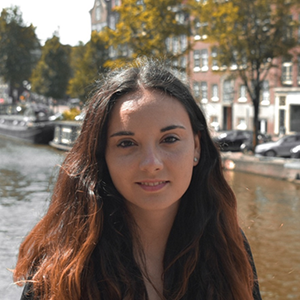Nerea García Ventades

Mi nombre es Nerea García Ventades y actualmente soy investigadora predoctoral en el departamento de Antropología Físicade la Universidad del País Vasco (UPV/EHU). Desde el año 2013, formo parte del grupo de investigación sobre “Biología Evolutiva Humana”, dóndehe tenido la oportunidad de desarrollar mis proyectos fin de grado y máster, ambos centrados en el análisis de restos óseos humanos para el diagnóstico de patologías como la artrosis o la Artritis Reumatoide. En el año 2016comencé mi tesis doctoral, cuyo proyecto pretende analizar la influencia que tienen algunos factores ambientales en la prevalencia de patologías articularesa través del estudio de la población medieval inhumada en la Catedral de Santa María de Vitoria-Gasteiz. Durante este tiempo, he participado como investigadora en diversos proyectos financiados, tanto por instituciones públicas como privadas.Además, los resultados de dichos proyectos han sido publicados en revistas científicas de impacto y se han presentado en diversos congresos de ámbito nacional e internacional.
En el año 2018 tuvela oportunidad de participaren la escuela de campo “Forensic Anthropology and Human Rights: Unconvering Somaliland´s Troubled Past”, organizada por el Equipo Peruano de Antropología Forense (EPAF) y desarrollada en Somalilandia (Somalia).Fue una experiencia profesional y personal excepcional ya que pude aportar mis conocimientos en la investigación de violaciones de derechos humanos, trabajando en el proceso de exhumación y posterior identificación de los restos óseos en el laboratorio.También he formado parte de la excavación en el Yacimiento del Paleolítico Medio del Abric Romaní (Barcelona), bajo la supervisión de Eudald Carbonell. Ambas experiencias fueron muy enriquecedoras en mi formación académica, ampliando mis conocimientos a la que vez que establecía lazos con investigadores de otras disciplinas científicas.
Por otro lado, me gustaría destacar mi gran interés y entusiasmo en la organización y gestión de actividades de carácter divulgativo, como las jornadas de la Facultad de Ciencia y Tecnologíao el Stand de ADN antiguo y AnálisisForense de la Zientzia Astea. Además, durante esta etapa he tenido la oportunidad de impartir prácticas de laboratorio en el Grado de Biología y de seminarios en el Grado de Arqueología de la Universidad de Barcelona (UB). Personalmente, considero que la divulgación científica debe ser un pilar fundamental de la investigación, ya que hace accesible la ciencia a la población permitiendo, por un lado, dar a conocer a la sociedad el destino de la financiación pública a la que ellos contribuyen y, por otro, proporcionando un mayor conocimiento científico.
My name is Nerea García Ventades and nowadays I am a predoctoral researcher at the department of Physical Anthropology of the University of the Basque Country (UPV/EHU). Since 2013, I am part of the “Human Evolutionary Biology” research group, where I had the opportunity to develop my final degree and master’s projects, both focused on the analysis of human bone remains in the diagnosis of pathologies such as Osteoarthritis or Rheumatoid Arthritis. In 2016, I started my doctoral thesis, whose project is focused on the influence of some environmental factors in the prevalence of joint diseases through the study of the medieval population recovered from Santa María Cathedral (Vitoria-Gasteiz, Spain). During these years, I have participated as researcher in diverse financed projects, both by public and private institutions. Besides, the results obtained have been published in scientific journals of impact and presented in different national and international congresses.
I participated in 2018 in the field school “Forensic Anthropology and Human Rights: Uncovering Somaliland´s Troubled Past”, organized by the Peruvian Forensic Anthropologist Team (EPAF) and celebrated in Somaliland (Somalia). This personal and professional experience was outstanding because I could contribute my knowledge in the investigation of human rights violations, working in the exhumation process and posterior identification of the skeletal remains in the laboratory. I have also been part of the excavation in the Middle Paleolithic site of Abric Romaní (Barcelona), under the supervision of Dr. Eudald Carbonell. Both experiences were enriching, increasing my knowledge while I established relation with researches from other scientific areas.
In addition, I would also like to highlight my great interest and enthusiasm in the organization and management of scientific communication activities, such as the Faculty of Science and Technology conferences or the Stand of Ancient DNA and Forensic Analysis during the Science week. Furthermore, during this time I have been involved in teaching assignments in the Degree of Biology at UPV/EHU and Archaeology at University of Barcelona (UB). Personally, I consider scientific communication as an important part in research, since it makes science more accessible to the entire population. On the one hand, this communication makes it possible to make society aware of the destination of public funding and, on the other, to contribute to a greater scientific knowledge.
